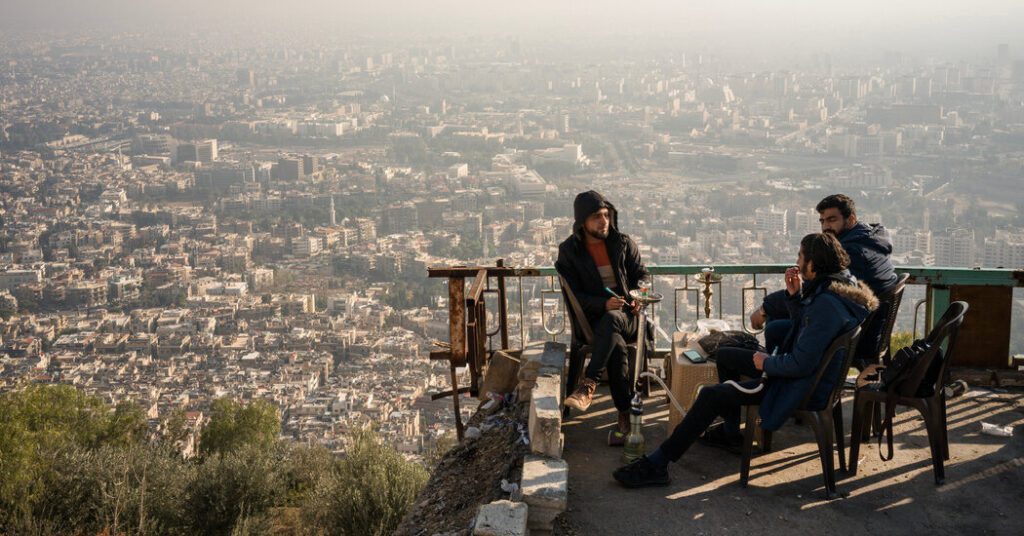Lebanon's prime minister, on his first official visit to Syria to meet with the new government, on Saturday called for ways for the two countries to work together to help Lebanon's large number of Syrian refugees return home.
Prime Minister Najib Mikati met with Ahmad al-Shara, leader of Syria's new government, in the Syrian capital Damascus on Saturday afternoon, the Lebanese Prime Minister's Office said. Al Shara heads Hayat Tahrir al-Sham, the Islamist group that last month spearheaded a blitzkrieg that toppled former Syrian President Bashar al-Assad's decades-long rule.
Speaking at a news conference in Damascus, Mikati said the two countries should quickly resolve the issue of the more than 1 million refugees Lebanon has taken in as a result of the Syrian civil war that began in 2011. Some have since returned, but many have not. Others still remain in Lebanon.
“Today, in the interests of both countries, there is an urgent need to address this issue as soon as possible and to return the displaced to a Syria that is thankfully on the verge of recovery,” Mikati said, adding that Al Shara He added that he believes what he says. supported the initiative.
Al-Shara said the two leaders discussed “unresolved issues” including border security, but did not comment on refugee repatriation. He said a committee would be set up to consider how to resolve various issues, but urged Syrians to lower their expectations for quick reforms in the poor country.
“We have a lot of problems in Syria,” Al Shara said. “We can't solve them all at once. We have to break them down and look for solutions for each one.”
Mikati's visit to Damascus comes after Joseph Aoun was elected Lebanon's president this week, after having been vacant for two years. Aoun is expected to begin talks on naming a new prime minister next week.
In Syria, Al-Shara faces the challenge of bringing order to a country ravaged by 14 years of civil war, which has divided the country into conflict zones and encouraged the proliferation of armed groups. He has urged public servants to return to work, students to return to school, and sought to quickly restore a sense of normalcy to families.
Lebanon, like other countries bordering Syria, is concerned that the unrest within the country could spill over into its territory. Last week, at least five Lebanese soldiers were injured in clashes along the Syrian border after Syrian militants opened fire on Lebanese soldiers. The Lebanese Army said its troops were attempting to close illegal border crossings in the area.
Mr. Mikati spoke to Mr. Al Shara by phone after the incident. “Syrian authorities are taking all necessary measures to restore calm on the border and prevent the problem from happening again,” al-Sharah promised in a telephone conversation, Mikati's office said at the time.
Underscoring these challenges, Syrian state media announced on Saturday that Syrian security forces had arrested Islamic State suspects who were planning a major attack in Damascus.
The government-controlled news agency SANA said the pair had planned to use explosives inside the Sayeda Zeinab mausoleum, a sacred site especially revered by Shiite Muslims on the outskirts of Damascus.
Although the US-led international coalition has largely defeated ISIS in its former strongholds in Iraq and Syria, the group remains active in some areas and continues to inspire attacks online.
Here's what else is happening in the area:
-
Gaza ceasefire negotiations: Israeli security chiefs will soon head to Qatar for high-level talks on a cease-fire agreement to free hostages held in Gaza, the Israeli government announced Saturday night. Israeli Prime Minister Benjamin Netanyahu's office announced that he had ordered David Barnea, head of Israel's Mossad intelligence agency, to lead a delegation to Doha, the capital of Qatar, for negotiations. Qatar and Egypt, with US support, have been mediating between Israel and Hamas. Negotiations appear to have been stalled for months, but Israeli and U.S. officials have expressed cautious optimism that a deal will be reached in the coming weeks.
-
Rockets from Gaza: As the war between Israel and Hamas continues for more than 15 months, Palestinian militants are still firing bullets from the Gaza Strip, but Israeli and U.S. officials say the group's military capabilities have significantly diminished. It states that On Saturday, an air raid siren sounded in the Israeli border area of Kerem Shalom after rockets were fired from southern Gaza. The Israeli military announced that it had successfully intercepted the missile.

